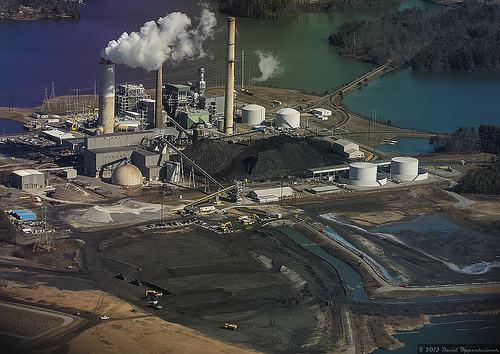The Sierra Club’s national campaign Beyond Coal got word earlier this month of a $30 million boost from Bloomberg Philanthropies. The Duke-Progress Energy coal-fired plant at Lake Julian in Skyland is one of Beyond Coal’s list of priority coal plants to retire and local environmental group MountainTrue is gearing up to oppose the upcoming renewal of the plant’s air pollution permit.
The Beyond Coal campaign, an effort started in 2010 to replace at least half of the nation’s coal-fired power plants, aims to see half the nation’s coal-burning plants replaced with clean energy sources by 2017. The recent $30 million grant builds on Bloomberg Philanthropies’ previous $50 million commitment, according to a press release from the donor, and raises the foundation’s overall investment in the Sierra Club’s Beyond Coal campaign to $80 million.
 “We are very pleased with [Bloomberg Philanthropies’] additional support to help continue our robust campaign to transition our country off dirty coal plants and replace them with clean energy sources,” said Kelly Martin, senior campaign representative for the Sierra Club Beyond Coal initiative.
“We are very pleased with [Bloomberg Philanthropies’] additional support to help continue our robust campaign to transition our country off dirty coal plants and replace them with clean energy sources,” said Kelly Martin, senior campaign representative for the Sierra Club Beyond Coal initiative.
The $30 million is meant to provide continuity and support for ongoing Beyond Coal efforts, rather than for any specific new programs at this point. And while the new funds won’t arrive in WNC for months, their anticipation has energized MountainTrue.
 “We are very happy that [Michael Bloomberg] has renewed his commitment to the clean energy movement through support for Beyond Coal,” said Julie Mayfield, co-director of MountainTrue, a regional environmental organization providing support for the WNC Beyond Coal campaign. “This has been one of the most effective environmental campaigns in the history of our movement, and it is far from being finished,”
“We are very happy that [Michael Bloomberg] has renewed his commitment to the clean energy movement through support for Beyond Coal,” said Julie Mayfield, co-director of MountainTrue, a regional environmental organization providing support for the WNC Beyond Coal campaign. “This has been one of the most effective environmental campaigns in the history of our movement, and it is far from being finished,”
The Lake Julian coal plant, located along the French Broad, has been a focus for several years for the WNC Beyond Coal campaign, which aims to raise public awareness and advocate reductions in energy-associated pollution. The campaign has focused on Lake Julian’s coal ash pond, groundwater water contamination and SO2 emissions from the plant.
Joan Walker, campaign coordinator for Beyond Coal, said a recent study commissioned by the Sierra Club using independent researchers showed the plant has caused excessive sulfur dioxide (SO2) pollution concentrations in the air near people’s homes, and in some outdoor areas such as the Bent Creek Area of Pisgah National Forest. According to the study’s models, she said, SO2 levels were as much as 3.5 times higher than what EPA has determined to be safe, exceeding minimum public health standards about one out of every three-to-four days since 2010.

Lake Julian’s Title V air pollution permit is up for renewal by WNC Regional Air Quality Agency. The agency will hold a public hearing on the renewal April 29 at 6 p.m. at the Erwin High School auditorium, 60 Lees Creek Road, in Asheville. Individuals must preregister to speak at the hearing and/or submit written comments. Participants who wish to speak at the hearing should plan to limit their comments to three minutes or less. The hearing officer will have the discretion to limit speaking times, if necessary, to accommodate the number of speakers.
Written comments will also be accepted until April 30 and can be submitted at the hearing or sent to: Betsy Brown, Air Quality Supervisor, WNC Regional Air Quality Agency, 49 Mt Carmel Road, Asheville, N.C. 28806 or emailed to betsy.brown@buncombecounty.org.
Walker, who is coordinating public opposition to the renewal, said the preliminary draft permit “allows the same inadequate numeric emissions limit that the plant has had for years: nearly 80 times higher than the limit necessary to attain EPA’s public health-based standard for SO2.”
Walker said she hopes that “the agency will take this opportunity to require Duke to reduce its SO2 pollution enough to eliminate the threats to public health and ensure that the federal minimum air quality standard for SO2 is not exceeded. Luckily, there’s an easy solution: Duke Energy can return to running pollution control equipment at full capacity and stop burning the high-sulfur coal they’ve been using in recent years.”
In defense of Duke Energy’s request for a renewal of the existing permit, spokesperson Jennifer Jabon said, “Environmental responsibility is a core value of Duke Energy, and we are committed to environmental stewardship in the communities we operate and serve. We understand there are a variety of views and appreciate that many groups are passionate about this issue. Duke Energy relies on a diverse portfolio of power generation to provide customers with affordable, reliable and increasingly-clean power. Duke Energy is building cleaner, more environmentally friendly natural gas plants to replace older, less efficient coal units. Late last year, Duke Energy Carolinas closed its last coal facility not equipped with advanced emission controls. We have retired seven of 14 North Carolina coal plants since 2011. Over the last decade, we’ve invested more than $300 million in environmental upgrades at the Asheville Plant. It was the first plant in North Carolina to have advanced flue-gas desulfurization, or scrubbers, to dramatically reduce air emissions. This was the result of the 2002 N.C. Clean Smokestacks Act that the state, utilities and the Sierra Club, among others, endorsed. It should be noted the Asheville Plant continues to meet air regulatory requirements.”
Now that Beyond Coal’s coffers have been enriched, Martin said, “the Sierra Club will continue to use tactics as varied as grassroots advocacy, community organizing, paid advertising, technical research and litigation. The Sierra Club will also continue their work to secure critical carbon emissions reductions under the President’s Clean Power Plan, push regulators to crack down on harmful pollution, and replace dirty power generation capacity with solar, wind and energy efficiency.”
Bloomberg Philanthropies began funding the Sierra Club’s Beyond Coal campaign in 2011 with a goal to phase out one-third of the nation’s coal plants, beginning with the oldest and most polluting units, and replacing them with cleaner energy sources and reducing toxic mercury emissions by 90 percent by 2020. The initial $50 million grant was used to expand the Sierra Club’s campaign from 15 states to 45. The program emphasizes the need for rigorous enforcement of state and federal environmental laws and helping communities impacted by coal mining and coal plants to make the clean energy transition and address concerns left from closing coal plants.
Since 2010, a total of 187 coal plants have either been retired or are scheduled for retirement. While not all of these are the result of the Beyond Coal campaign, the Sierra Club says the campaign has played a key role in helping with many of those retirements. According to Sierra Club estimates, coal-generated electricity has dropped from 52 percent to under 40 percent in the United States.



Why yes, shutdown the plant so rates can “necessarily” skyrocket. Loons need a good kick in the rear. It’s coming.